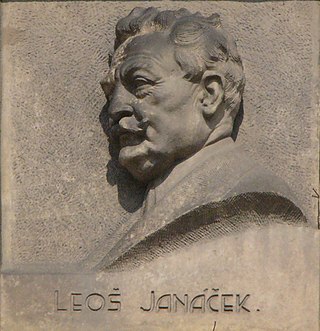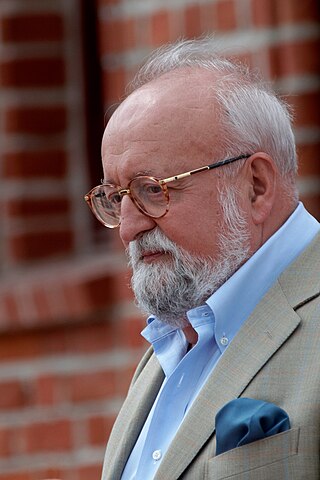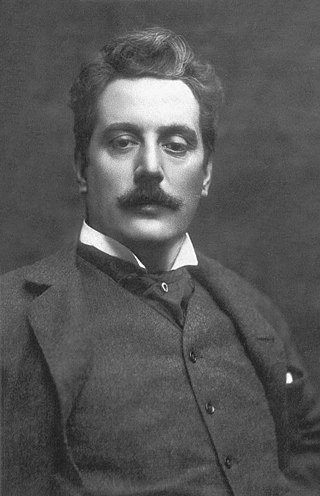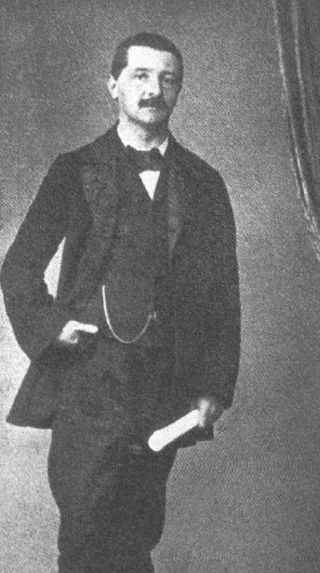
The War Requiem, Op. 66, is a choral and orchestral composition by Benjamin Britten, composed mostly in 1961 and completed in January 1962. The War Requiem was performed for the consecration of the new Coventry Cathedral, in the English county of Warwickshire, which was built after the original fourteenth-century structure was destroyed in a World War II bombing raid. The traditional Latin texts are interspersed, in telling juxtaposition, with extra-liturgical poems by Wilfred Owen, written during World War I.

Great Mass in C minor, K. 427/417a, is the common name of the musical setting of the mass by Wolfgang Amadeus Mozart, which is considered one of his greatest works. He composed it in Vienna in 1782 and 1783, after his marriage, when he moved to Vienna from Salzburg. The large-scale work, a missa solemnis, is scored for two soprano soloists, a tenor and a bass, double chorus and large orchestra. It remained unfinished, missing large portions of the Credo and the complete Agnus Dei.

The Glagolitic Mass is a composition for soloists, double chorus, organ and orchestra by Leoš Janáček. Janáček completed the work in 1926. It received its premiere by the Brno Arts Society, conducted by Jaroslav Kvapil, in Brno on 5 December 1927. Janáček revised the mass the next year.

Gabriel Fauré composed his Requiem in D minor, Op. 48, between 1887 and 1890. The choral-orchestral setting of the shortened Catholic Mass for the Dead in Latin is the best-known of his large works. Its focus is on eternal rest and consolation. Fauré's reasons for composing the work are unclear, but do not appear to have had anything to do with the death of his parents in the mid-1880s. He composed the work in the late 1880s and revised it in the 1890s, finishing it in 1900.
The Armed Man is a Mass by Welsh composer Karl Jenkins, subtitled "A Mass for Peace". The piece was commissioned by the Royal Armouries Museum for the Millennium celebrations, to mark the museum's move from London to Leeds, and it was dedicated to victims of the Kosovo crisis. Like Benjamin Britten's War Requiem before it, it is essentially an anti-war piece and is based on the Catholic Mass, which Jenkins combines with other sources, principally the 15th-century folk song "L'homme armé" in the first and last movements. It was written for SATB chorus with soloists and a symphonic orchestra. Guy Wilson, then master of the museum, selected the texts for the mass.
Andrew Lloyd Webber's Requiem is a requiem mass, which premiered in 1985. It was written in memory of the composer's father, William Lloyd Webber, who died in 1982.
The Cambridge Singers is an English mixed voice chamber choir formed in 1981 by their director John Rutter with the primary purpose of making recordings under their own label Collegium Records.

The Requiem, Op. 9, is a 1947 setting of the Latin Requiem by Maurice Duruflé for a solo baritone, mezzo-soprano, mixed choir, and organ, or orchestra with organ. The thematic material is mostly taken from the Mass for the Dead in Gregorian chant. The Requiem was first published in 1948 by Durand in an organ version.

Gioachino Rossini's Petite messe solennelle was written in 1863, possibly at the request of Count Alexis Pillet-Will for his wife Louise, to whom it is dedicated. The composer, who had retired from composing operas more than 30 years before, described it as "the last of my péchés de vieillesse".

Igor Stravinsky composed his Mass between 1944 and 1948. This 19-minute setting of the Roman Catholic Mass exhibits the austere, Neoclassic, anti-Romantic aesthetic that characterizes his work from about 1923 to 1951. The Mass also represents one of only a handful of extant pieces by Stravinsky that was not commissioned. Part of the motivation behind its composition has been cited by Robert Craft and others as the product of a spiritual necessity, as Stravinsky intended the work to be used functionally.

Dona nobis pacem is a cantata written by Ralph Vaughan Williams in 1936 and first performed on 2 October of that year. The work was commissioned to mark the centenary of the Huddersfield Choral Society. Vaughan Williams produced his plea for peace by referring to recent wars during the growing fears of a new one. His texts were taken from the Mass, three poems by Walt Whitman, a political speech, and sections of the Bible. A.V. Butcher has analysed Vaughan Williams' use of the Whitman poems in this composition.

Polish Requiem, also A Polish Requiem, is a large-scale requiem mass for soloists, mixed choir and orchestra by the Polish composer Krzysztof Penderecki. The Lacrimosa, dedicated to the trade union leader Lech Wałęsa, was written for the unveiling of a statue at the Gdańsk Shipyard to commemorate those killed in the Polish anti-government riots in 1970. He expanded the work into a requiem, writing other parts to honour different patriotic events over the next four years.

John Rutter's Requiem is a musical setting of parts of the Latin Requiem with added psalms and biblical verses in English, completed in 1985. It is scored for soprano, mixed choir and orchestra or chamber ensemble.

Giacomo Puccini's Messa or Messa a quattro voci is a Mass composed for orchestra and four-part choir with tenor and baritone soloists. Strictly speaking, the piece is a full Mass, not a true Messa di Gloria.
Antonín Dvořák's Requiem in B♭ minor, Op. 89, B. 165, is a funeral Mass scored for soloists, choir and orchestra. It was composed in 1890 and performed for the first time on 9 October 1891, in Birmingham, England, with the composer conducting.
Requiem for a Tribe Brother is a choral work by the Australian-born composer Malcolm Williamson.

Missa Gaia/Earth Mass is an album released by Paul Winter in 1982 for Living Music. He co-wrote the mass with Paul Halley, Jim Scott, Oscar Castro-Neves, and Kim Oler. The title stems from two languages, Latin and Greek. The Earth Mass was one of the first contributions made by Paul Winter when he and his Paul Winter Consort became the artists in residence at the Cathedral of St. John the Divine in New York City. The mass includes the usual text, such as the Kyrie and the Agnus Dei, and also other text, hymns, and instrumental pieces. The mass is an environmental liturgy of contemporary music. It features the instrumentation of the Paul Winter Consort along with a choir, vocal soloists, and the calls of wolves, whales, and many other animals that are woven into the pieces, sometimes used as the melody: The "Kyrie" is derived from the call of a wolf, the "Sanctus" from the songs of humpback whales. Man literally learns how to sing from animals. Missa Gaia is a mass that is equally ecumenical as it is ecological. It involves all voices of the earth. Musically the ecumenical character is underlined by a web of various musical traditions and styles: from Gregorian chant of the Middle Ages through Protestant hymns, Romantic organ music, African instruments, Latin American rhythms, elements of Gospel song to contemporary rock ballad. The name "Missa Gaia" refers to the "Gaia hypothesis" of scientists James Lovelock and Lynn Margulis which states "that the entire range of living matter on Earth, from whales to viruses, and from oaks to algae, could be regarded as constituting a single living entity, capable of manipulating the Earths's atmosphere to suit its overall needs and endowed with faculties and power far beyond its constituent parts". Since it was first written, the mass is performed annually at the Cathedral of St. John the Divine at The Feast of St. Francis which is the blessing of the animals. The first complete performance in Europe was presented by the GospelChor Saarbrücken (Germany) in 1995 under the direction of Wilhelm Otto Deutsch.
Joanne Lunn is an English classical soprano in opera and concert.
Roderick Gregory Coleman Williams OBE is a British baritone and composer.

The Windhaager Messe, WAB 25, is a missa brevis composed by Anton Bruckner in 1842.













